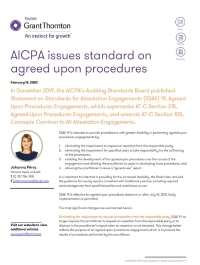-
Financial statements audits
Financial statement audits
-
Compliance audits
Compliance audits
-
Compilations and reviews
Compilations and audit
-
Agreed-upon procedures
Agreed-upon procedures
-
Corporate and business tax
Our trusted teams can prepare corporate tax files and ruling requests, support you with deferrals, accounting procedures and legitimate tax benefits.
-
International tax
Our teams have in-depth knowledge of the relationship between domestic and international tax laws.
-
Tax compliance
Business Tax
-
Individual taxes
Individual taxes
-
Estate and succession planning
Estate and succession planning
-
Global mobility services
Through our global organisation of member firms, we support both companies and individuals, providing insightful solutions to minimise the tax burden for both parties.
-
Sales and use tax and indirect taxes
SUT/ VAT & indirect taxes
-
Tax incentives program
Tax incentives program
-
Transfer Pricing Study
The laws surrounding transfer pricing are becoming ever more complex, as tax affairs of multinational companies are facing scrutiny from media, regulators and the public
-
Business consulting
Our business consulting services can help you improve your operational performance and productivity, adding value throughout your growth life cycle.
-
Forensic and investigative services
At Grant Thornton, we have a wealth of knowledge in forensic services and can support you with issues such as dispute resolution, fraud and insurance claims.
-
Fraud and investigations
The commercial landscape is changing fast. An ever more regulated environment means organizations today must adopt stringent governance and compliance processes. As business has become global, organizations need to adapt to deal with multi-jurisdictional investigations, litigation, and dispute resolution, address the threat of cyber-attack and at the same time protect the organization’s value.
-
Dispute resolutions
Our independent experts are experienced in advising on civil and criminal matters involving contract breaches, partnership disputes, auditor negligence, shareholder disputes and company valuations, disputes for corporates, the public sector and individuals. We act in all forms of dispute resolution, including litigation, arbitration, and mediation.
-
Business risk services
We can help you identify, understand and manage potential risks to safeguard your business and comply with regulatory requirements.
-
Internal audit
We work with our clients to assess their corporate level risk, identify areas of greatest risk and develop appropriate work plans and audit programs to mitigate these risks.
-
Service organization reports
As a service organization, you know how important it is to produce a report for your customers and their auditors that instills confidence and enhances their trust in your services. Grant Thornton Advisory professionals can help you determine which report(s) will satisfy your customers’ needs and provide relevant information to your customers and customers’ auditors that will be a business benefit to you.
-
Transaction advisory services
Transactions are significant events in the life of a business – a successful deal that can have a lasting impact on the future shape of the organizations involved. Because the stakes are high for both buyers and sellers, experience, determination and pragmatism are required to bring deals safely through to conclusion.
-
Mergers and acquisitions
Globalization and company growth ambitions are driving an increase in M&A activity worldwide as businesses look to establish a footprint in countries beyond their own. Even within their own regions, many businesses feel the pressure to acquire in order to establish a strategic presence in new markets, such as those being created by rapid technological innovation.
-
Valuations
We can support you throughout the transaction process – helping achieve the best possible outcome at the point of the transaction and in the longer term.
-
Recovery and reorganization
We provide a wide range of services to recovery and reorganisation professionals, companies and their stakeholders.
In December 2019, the AICPA’s Auditing Standards Board published Statement on Standards for Attestation Engagements (SSAE) 19, Agreed Upon Procedures Engagements, which supersedes AT-C Section 215, Agreed-Upon Procedures Engagements, and amends AT-C Section 105, Concepts Common to All Attestation Engagements.
SSAE 19 is intended to provide practitioners with greater flexibility in performing agreed-upon procedures engagements by:
- eliminating the requirement to request an assertion from the responsible party,
- eliminating the requirement for specified users to take responsibility for the sufficiency of the procedures,
- enabling the development of the agreed-upon procedures over the course of the engagement and allowing the practitioner to assist in developing those procedures, and
- allowing the practitioner to issue a “general-use” report.
It is important to note that in providing for the increased flexibility, the Board also retained the guidance for issuing reports consistent with traditional practice, including required acknowledgments from specified parties and restrictions on use.
SSAE 19 is effective for agreed-upon procedures dated on or after July 15, 2021. Early implementation is permitted.
The most significant changes are summarized herein.
Eliminating the requirement to request an assertion from the responsible party. SSAE 19 no longer requires the practitioner to request an assertion from the responsible party or to disclose in the practitioner’s report when an assertion is not obtained. This change better reflects the purpose of an agreed-upon procedures engagement, which is to present the results of procedures performed by the practitioner.
Eliminating the requirement for specified users to take responsibility for the sufficiency of the procedures. SSAE 19 no longer requires specified parties to take responsibility for the sufficiency of procedures performed, which was a required step in agreeing to the terms of the engagement. This change eliminates the issue potentially created when procedures evolve, or additional specified parties are added during the engagement. Under SSAE 19, if appropriate in the circumstances, the practitioner instead requires only the engaging party to agree to and acknowledge that the procedures performed are appropriate to meet the intended purpose of the engagement prior to issuing the practitioner’s report.
Enabling the development of the agreed-upon procedures to occur over the course of the engagement and allowing the practitioner to assist in developing those procedures. SSAE 19 allows procedures to be developed by the practitioner, the engaging party, the intended users of the practitioner’s report, or any combination thereof. Procedures can also be developed over the course of the engagement without obligating the practitioner to require an updated engagement letter or acknowledgment from the other parties to obtain agreement on the revised procedures. Prior to issuing the practitioner’s report, the engaging party is required to agree to and acknowledge that the procedures performed are appropriate to meet the intended purpose of the engagement, which can be documented in the engagement letter, an addendum to the engagement letter, a representation letter, or some other written communication.
Allowing the practitioner to issue a ‘general-use’ report. As a result of no longer requiring users of the practitioner’s report, other than the engaging party, to agree to and acknowledge that the procedures performed are appropriate to meet the intended purpose of the engagement, SSAE 19 allows the practitioner to issue a general-use report. The report includes language to advise users that the procedures performed may not meet their needs and to inform them that is it their responsibility to determine whether the procedures performed are appropriate for their purposes. The practitioner is still allowed to restrict the use of the agreed-upon procedures report if, in his or her professional judgment, such restriction is appropriate.
Source:
Grant Thornton, On the Horizon January 23, 2020.
We are committed to keep you updated of all developments that may affect the way you do business in Puerto Rico. Please contact us for further assistance in relation to this or any other matter.


